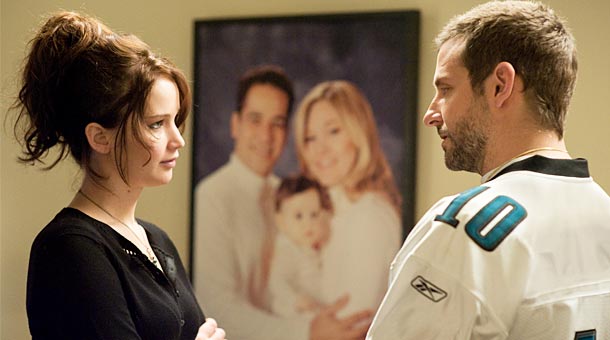
Silver Linings Playbook tweaks its genre’s formula enough to make the usual trappings feel fresh again.

Silver Linings Playbook tweaks its genre’s formula enough to make the usual trappings feel fresh again.
David O. Russell continues his transformation into a mainstream prestige director with Silver Linings Playbook, an enjoyable crowd-pleaser that puts 2012’s other romantic comedies to shame. Russell’s transition from fare like Three Kings and I Heart Huckabees is not necessarily a bad thing either. Just as The Fighter breathed new life into a standard sports drama, Silver Linings Playbook tweaks its genre’s formula enough to make the usual trappings feel fresh again.
The movie opens with Pat Solitano (Bradley Cooper) being released from a psychiatric ward. Eight months earlier he caught his wife sleeping with a co-worker and nearly beat the man to death, a manic episode that got him diagnosed as being bipolar. Now living with his parents (Jacki Weaver and Robert De Niro), Pat spends his time trying to find a way to win back his wife despite her putting out a restraining order against him. As Pat’s attempts to control his condition increasingly fail, he’s introduced to Tiffany (Jennifer Lawrence), a young widow. Everyone around Pat and Tiffany seems to be forcing the two of them together, hoping that they can bond over their collective mental troubles, and despite a rocky start they soon form a friendship.

Russell, who also wrote the screenplay (an adaptaion of Matthew Quick’s novel), spends the first act showing Pat’s attempt to transition back into a normal life. Things quickly turn sour as Pat refuses to take medication and, as he realizes how dire the situation with his wife is, the optimistic philosophy of finding life’s silver linings is constantly challenged. Pat’s violent outbursts, coupled with his sincere optimism quickly make him a character worth rooting for. Once Tiffany is finally brought into the picture, with the two of them hilariously swapping medication stories at a dinner party, her presence feels like a relief.
It’s these sorts of alterations to the formulaic romantic comedy that makes Silver Linings Playbook stand out. Pat and Tiffany’s coupling feels necessary for the both of them to overcome their individual problems, and Cooper and Lawrence’s sympathetic performances along with their excellent chemistry easily sell this idea. The supporting cast only continues to show how Russell’s greatest strength as a writer and director is the way he infuses a sense of naturalism into the characters. Everyone in the film, from De Niro as Cooper’s superstitious sports-obsessed father to Chris Tucker as a psych ward patient who constantly tries to escape, feel like well-rounded and likable characters. By making everybody so enjoyable to watch, the more clichéd elements of the plot aren’t as noticeable and easy to forgive.
There are plenty of other unique touches throughout Silver Linings Playbook. An expected twist late in the second act is surprisingly subverted in one of the film’s more inspired choices. Russell also likes to throw in a few neat ideas, my favourite being a rushed tracking shot on anyone who encounters Pat that looks more appropriate for a horror movie. Fans of Russell’s earlier films might lament his new career path as him selling out, but doing so doesn’t give him enough credit. His work is still subversive, but now it’s getting him better results.